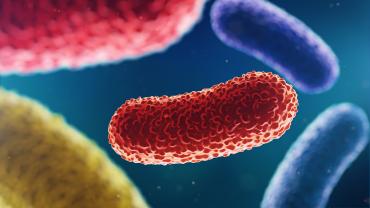
Osteoarthritis (OA) is a joint disease associated with factors related to age, the inflammatory response, metabolic changes, and oxidative stress. It affects more than 60% of older individuals and has become a growing economic burden at both individual and societal levels. Recent research has explored the potential link between OA, nutrition, and the gut microbiome.
The full etiology of OA remains unclear; however, a review by Tan and colleagues investigates the potential connection between the gut microbiome and bone health. The authors describe a potential link between the gut microbiome and pathogenesis of OA. Risk factors for OA, such as metabolic syndrome and other chronic diseases, have been linked in research with the gut microbiome. Imbalances in the gut microbiome may be related to age, diet, and certain diseases. These imbalances may contribute to the pathogenesis of OA through certain biochemical pathways.
Cartilage has been shown to contain microbial DNA. Animal studies have sampled cartilage from OA-susceptible mice and compared it to OA-resistant mice. These studies found that the cartilage samples differed in microbial signatures. Human studies have also shown differences in cartilage microbial DNA signatures between individuals with OA and controls. One animal study showed a negative association between knee joint damage and the presence of Bacteroides, Bifidobacterium, and Roseburia. A positive association was observed between knee joint damage, increased blood endotoxin levels, and the presence of Clostridium leptum, Akkermansia muciniphila, and Faecalibacterium prausnitzii.
An animal study compared controls to antibiotic-treated mice and lipopolysaccharide (LPS)-treated mice. LPS is a molecule that induces an inflammatory response. In the LPS-treated mice, increased levels of pro-inflammatory macrophages and articular cartilage structural damage were observed.
The administration of certain probiotics, including Lactobacillus casei (L. casei) and L. acidophilus, was shown in some animal studies to help support cartilage integrity and help attenuate pro-inflammatory cytokine responses in synovial fluid. Another study involving the administration of Bifidobacterium longum showed decreases in cartilage degradation and increases in cartilage matrix synthesis. The Clostridium butyricum species has been shown to produce butyric acid, a short-chain fatty acid known to support many aspects of human health. C. butyricum administration was shown in an animal study to help preserve joint structure as compared to a placebo. Butyric acid has also been shown to help inhibit pro-inflammatory cytokines, such as nuclear factor-kappa B and interleukin-1.
In human studies, a 24-week placebo-controlled, randomized trial involved supplementation with L. casei shirota in individuals with knee osteoarthritis. Reductions in high sensitivity C-reactive protein and significant reductions in pain scores and stiffness were observed.
More information is necessary before clinical conclusions can be determined. However, Tan and colleagues suggest there may be a link between the gut microbiome and osteoarthritis. In addition, certain probiotics may support the body’s response to oxidative stress and inflammation.
By Colleen Ambrose, ND, MAT